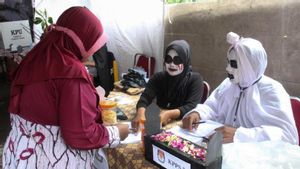JAKARTA - Artist Alice Norine suddenly shared unpleasant news. He admitted to having sarkoma cancer, a rare type of cancer that made him menopause early.
"I was sentenced to sarkoma cancer, which is a rare cancer that develops in the uterine muscles," said Alice Norin, opening her story about the illness she was suffering from.
The mother of two children admitted that she had felt pain in her lower abdomen since August 2023, which after conducting an examination turned out to be an emom. According to the doctor who examined her, Alice did not need surgery to remove the miom if she felt it was not disturbing.
But then he had an unbearable illness late last year. This condition made Alice Norin re-examine her to a doctor until she was finally sentenced to sarkoma cancer.
Citing Johns Hopkin Medicine, sarkoma is a rare cancer that develops in the bones and soft tissues, including fats, muscles, blood vessels, nerves, internal skin tissue, and fibrosa tissue.
Sarkoma is rare, only one percent of all cancer diagnosis in adults and about 15 percent of childhood diagnosis.
According to the National Cancer Institute, about 12,000 cases of soft tissue sarkoma and 3,000 cases of bone sarkoma were diagnosed in the United States each year.
Meanwhile, the Mayo Clinic revealed, there are more than 70 types of sarkoma. The treatment of sarkoma cancer also varies, depending on the type, location, to the factors that accompany it.
Reflecting on the story shared by Alice Norin, dr. Boyke Dian Nugraha said that the swelling in the uterus is often mistaken for an ordinary myom. But after further investigation, cancer cells are often found that have spread.
Women at menopaus age are more at risk of developing sarkoma cancer. Therefore, vigilance is needed if abnormal bleeding appears because this can be an early indication of cancer developing.
Dr. Boyke said that the sarkoma cancer that attacks the uterine started with symptoms of bleeding. This is what makes people wrong, so that they are considered as ordinary bleeding.
"He usually finds out, there is bleeding first, a lot of bleeding, then a series is carried out for diagnosis to stop the bleeding. Usually it starts with hyperplasia, hyperplasia is still tame, but if there is hyperplasia, there will also be swelling, it's violent hyperplasia," he said.
SEE ALSO:
"At that time it was known, because it was very difficult to detect uterine cancer, if uterine neck cancer with pap smeared, it would also be possible, but if the uterine's body cancer had to be diagnosed using a series, it would be dredged and then found out that the cells were not normal," he continued.
abnormal bleeding is not like normal menstruation. If bleeding does not stop even though given the drug, dr. Boyke suggested to immediately check himself into health facilities.
Sarkoma is formed when unresolved bone cells or soft tissue undergo changes in its DNA, and develops into cancer cells that grow in an unregulated way.
They can eventually form a mass or tumor that can attack the surrounding healthy tissue. If not treated, cancer can spread through the bloodstream or lymphatic system from the main location of its formation to other organs.
Diungkap dr. Boyke terdapat banyak faktor yang menyebabkan cancer sarkoma. Selain faktor genenik, ia juga menyebut gaya hidup bisa menjadi pengurus.
"There are multifactors, there are many factors, genetics or cancer history, the risk is also higher. Besides that, of course, lifestyle factors," explained dr. Boyke.
According to dr. Boyke, the risk of sarkoma cancer that appears in the uterus has increased three to five times before the menopause. He also suggested that it is better to make early detections to anticipate cancer cells spreading more widely and being in advanced stages. The reason is dr. Boyke said the chances of recovery are relatively smaller when they are in advanced stages.
"It is better if when entering the period of menopause, nuts, and meat with high fat are avoided, foods that contain phytoestrogen. Expand green vegetables," said dr. Boyke.
The English, Chinese, Japanese, Arabic, and French versions are automatically generated by the AI. So there may still be inaccuracies in translating, please always see Indonesian as our main language. (system supported by DigitalSiber.id)














